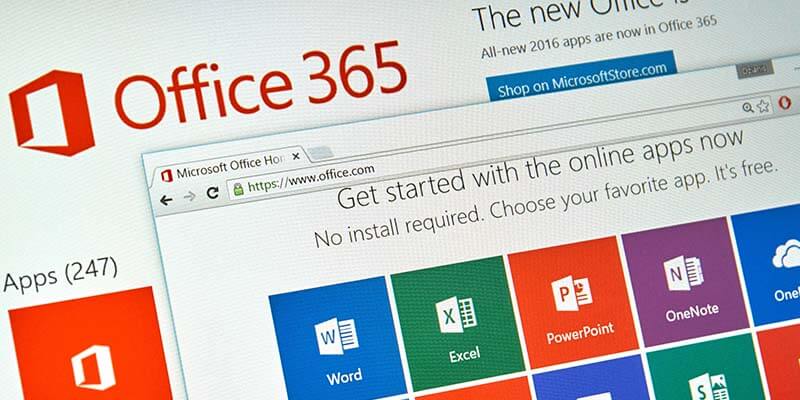The leading debate of office suite productivity tools is, of course, Microsoft 365 v G Suite. Both products have their advantages and disadvantages, which will be discussed in this article so an informed decision can be made as to which one is best for your business. As an IT Support Company in Brisbane, we’ve done our fair share of research when it comes to finding and utilising the most effective business productivity tools available.
Microsoft 365 v G Suite: All you need to know
If you don’t already know, Microsoft 365 and G suite allow you to perform common business tasks ‘in the cloud’. With both solutions, you can easily create documents, spreadsheets and presentations which are collaborative, enhancing workplace productivity. They also provide video conferencing functionality, which makes it easier to communicate with clients and conduct meetings without having to travel to other locations.
Cloud storage is a major feature of both tools and effectively allows you to store your important data on remote servers which are accessed via the internet. Cloud storage has many advantages for businesses, such as cost. It is proven that companies and individuals who opt for cloud storage, as opposed to in-house hosting solutions or external hard drives, benefit from decreased operating costs. Furthermore, cloud storage improves accessibility as, provided you have the necessary credentials and internet access, you can access all files, folders, photos, videos etc. from anywhere in the world. Arguably one of the greatest advantages of using the cloud to store your data, however, is its recovery capabilities. Technology can be somewhat temperamental, and sometimes things go wrong, which you simply can’t avoid. However, cloud storage provides a ‘back up plan’ as you can always access the cloud to retrieve any lost or damaged data when using the appropriate services within the respective cloud.
Although cloud storage is a shared feature of both programs, there are many other factors that need to be taken into consideration. For more information about our cloud computing services in Brisbane, get in touch with ONGC Systems. In the meantime, to fully understand which productivity tool is best for your business, keep reading.
Familiar Tools
Whilst Microsoft 365 and G Suite are both loaded with productivity tools one of the big draw cards for businesses to use Microsoft 365 is the access to familiar productivity tools like Microsoft Word, Excel, PowerPoint, Outlook and so on. Whilst G Suite has a number of cross-compatibility with Microsoft files and similar collaboration functions, their proprietary Google Sheets and Google Docs tools are quite different and require a fair bit of getting used to which makes adoption a little more challenging.
Security
Microsoft 365 and G Suite come with a plethora of security features. One area that the Google solution falls short is around the management of your devices. Microsoft 365 offers your business the ability to secure your whole environment from your device (PC / Laptop / Phone / Tablet) all the way through to your cloud environment. Examples of this include enforcing password policies on your devices and cloud environment. Additionally, in the event you have a lost or stolen piece of equipment, it can still be remotely controlled and your company data wiped to protect your sensitive information. Complimentary Microsoft tools such as Bit Defender, Advanced Threat Protection, Data Loss Prevention and Azure Information Protection also mean that you’ve got the best deference against external and internal threats.
Workflow automation
There is an increasing need to digitize workflow in today’s workplace, which is why Microsoft 365 allows your business to automate document workflows right out-of-the-box with SharePoint. Microsoft 365 also boasts the ability to build custom workflows across applications and SaaS services with Flow. Workflow automation is also possible with G Suite thanks to its app making feature.
Data-driven decision making
Having access to the right tools and data you need to make decisions is essential for a successful business. Microsoft 365 offers rich visualisations in prebuilt or custom dashboards and allows you to use natural language to ask questions and gain insights. G suite also has a similar feature in Sheets, which was designed to provide frictionless collaboration and information sharing.
Employee engagement
A lack of employee engagement can be very detrimental to your business, so investing in a suite which utilises online communities, teamwork hubs and intranet sites would be beneficial. Microsoft 365 does all of the above, as well as fostering open sharing and learning for people to exchange interests, expertise and ideas. Unfortunately, G Suite lacks employee engagement tools such as live events and chat functions with integrated features such as calendaring, calling and tabs to access apps.
Accessibility and inclusiveness
There is no limit to what people can achieve when technology reflects the diversity of everyone who uses it. This is highlighted by the many features of Microsoft 365, which include:
- Speech to text conversion
- Dictation and Windows Hello sign in
- Closed captioning, mono sound and live call transcription
- Accessibility checkers, accessible templates and auto generated Alt-Text
Although G Suite offers similar features, they require 3rd party applications to provide solutions as accessible as Microsoft 365.
The verdict
It cannot be denied that many business leaders prefer Microsoft 365 to G suite, and it is clear to see why. Although G suite includes a range of productivity and collaboration tools, they are not as pervasive as those created by Microsoft. For this reason, we believe Microsoft 365 is the best office suite productivity tool for your business.







